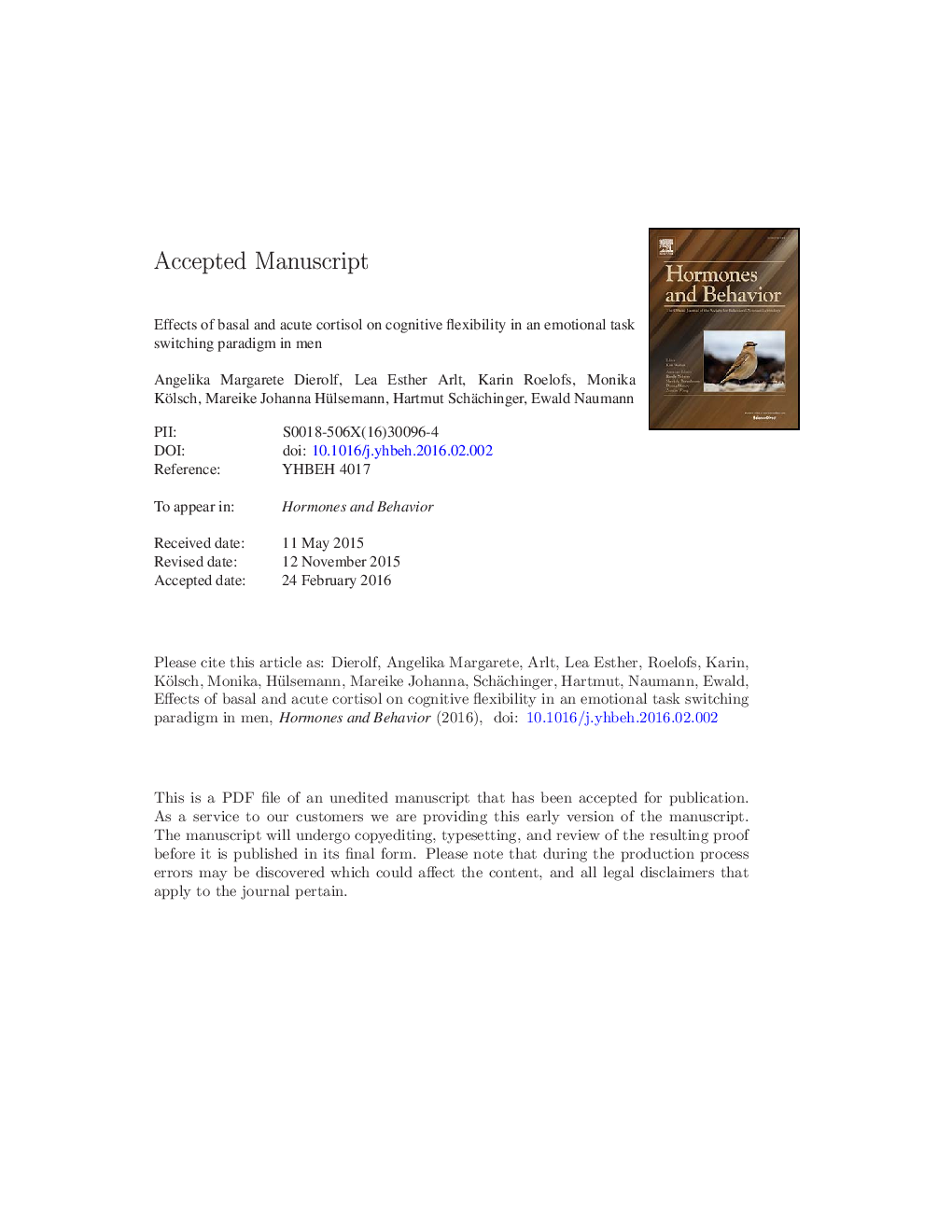| کد مقاله | کد نشریه | سال انتشار | مقاله انگلیسی | نسخه تمام متن |
|---|---|---|---|---|
| 6794381 | 540625 | 2016 | 37 صفحه PDF | دانلود رایگان |
عنوان انگلیسی مقاله ISI
Effects of basal and acute cortisol on cognitive flexibility in an emotional task switching paradigm in men
ترجمه فارسی عنوان
اثرات کورتیزول حاد و پایدار بر انعطاف پذیری شناختی در یک پارادایم تعویض کار هیجانی در مردان
دانلود مقاله + سفارش ترجمه
دانلود مقاله ISI انگلیسی
رایگان برای ایرانیان
کلمات کلیدی
عملکرد اجرایی، کنترل شناختی، انعطاف پذیری شناختی، سوئیچ کاری احساسی، کورتیزول، غیر ژنتیکی، کورتیزول خارجی واکنش بیداری کورتیزول، کورتیزول پایه،
ترجمه چکیده
فرضیه هورمون استرس کورتیزول بر توابع شناختی تاثیر می گذارد. در حالی که تغییرات ناشی از کورتیزول به ویژه حافظه توصیفی به خوبی مورد بررسی قرار گرفته است، در مورد تاثیر آن در عملکرد اجرایی به میزان قابل توجهی کمتر است. علاوه بر این، بیشتر تحقیقات روی اثرات آهسته متمرکز شده و اثرات غیر ژنومی سریع مورد بررسی قرار نگرفته است. مطالعه حاضر با هدف بررسی تأثیر تجویز کورتیزول حاد و همچنین سطوح کورتیزول پایه بر انعطاف پذیری شناختی، یک عملکرد اجرایی اصلی، در فرایند زمان غیر ژنومی انجام شده است. سی و هشت مرد سالم به طور تصادفی به صورت تصادفی به دو گروه کورتیزول یا پلاسبو تقسیم شدند تا قبل از انجام یک پارادایم سوئیچینگ با چهره های خوشحال و عصبانی به عنوان محرک ها. سطح کورتیزول در شش نقطه در طول آزمایش اندازه گیری شد. علاوه بر این، قبل از آزمایش، اندازه گیری کورتیزول بازال برای پاسخ بیداری کورتیزول در سه روز متوالی بلافاصله بعد از بیداری و 30، 45 و 60 درجه سانتیگراد یک دقیقه بعد انجام شد. اول و مهمتر از همه، نتایج نشان داد که اثر شدید کورتیزول حاد و پایه بر هزینه های سوئیچ زمان واکنش، به ویژه برای چهره های عصبانی. در گروه دارونما، کورتیزول پایه پایه با حداقل هزینه سوئیچ همراه بود، در حالی که کورتیزول پایه پایه با حداکثر هزینه سوئیچ مرتبط بود. در مقابل، پس از تزریق کورتیزول، سطح کورتیزول پایه هیچ تاثیری نداشت. این نتایج نشان می دهد که اثرات انعطاف پذیری شناختی از تجویز کورتیزول حاد تنها در مردان بالای کورتیزول پایه دیده می شود. این نتیجه، وابستگی متقابل تجویز کورتیزول را تأیید می کند و نشان دهنده ارتباط میزان مصرف کورتیزول پایه است.
موضوعات مرتبط
علوم زیستی و بیوفناوری
بیوشیمی، ژنتیک و زیست شناسی مولکولی
علوم غدد
چکیده انگلیسی
The stress hormone cortisol is assumed to influence cognitive functions. While cortisol-induced alterations of declarative memory in particular are well-investigated, considerably less is known about its influence on executive functions. Moreover, most research has been focused on slow effects, and rapid non-genomic effects have not been studied. The present study sought to investigate the impact of acute cortisol administration as well as basal cortisol levels on cognitive flexibility, a core executive function, within the non-genomic time frame. Thirty-eight healthy male participants were randomly assigned to intravenously receive either cortisol or a placebo before performing a task switching paradigm with happy and angry faces as stimuli. Cortisol levels were measured at six points during the experiment. Additionally, before the experiment, basal cortisol measures for the cortisol awakening response were collected on three consecutive weekdays immediately following awakening and 30, 45, and 60Â min after. First and foremost, results showed a pronounced impact of acute and basal cortisol on reaction time switch costs, particularly for angry faces. In the placebo group, low basal cortisol was associated with minimal switch costs, whereas high basal cortisol was related to maximal switch costs. In contrast, after cortisol injection, basal cortisol levels showed no impact. These results show that cognitive flexibility-enhancing effects of acute cortisol administration are only seen in men with high basal cortisol levels. This result supports the context dependency of cortisol administration and shows the relevance of taking basal cortisol levels into account.
ناشر
Database: Elsevier - ScienceDirect (ساینس دایرکت)
Journal: Hormones and Behavior - Volume 81, May 2016, Pages 12-19
Journal: Hormones and Behavior - Volume 81, May 2016, Pages 12-19
نویسندگان
Angelika Margarete Dierolf, Lea Esther Arlt, Karin Roelofs, Monika Kölsch, Mareike Johanna Hülsemann, Hartmut Schächinger, Ewald Naumann,
